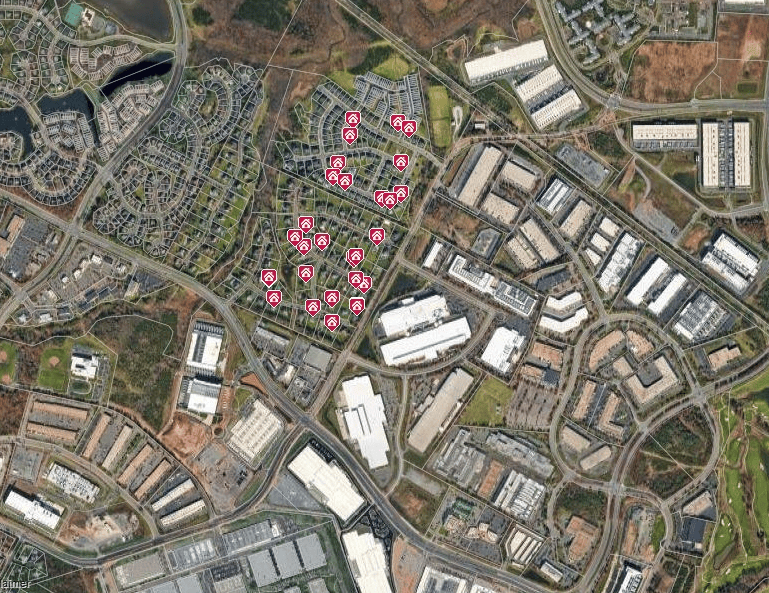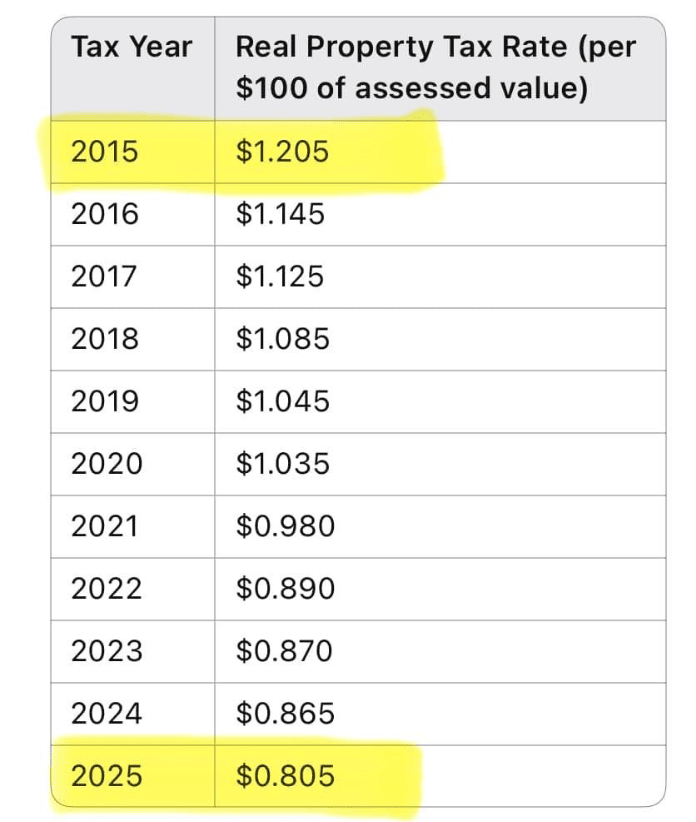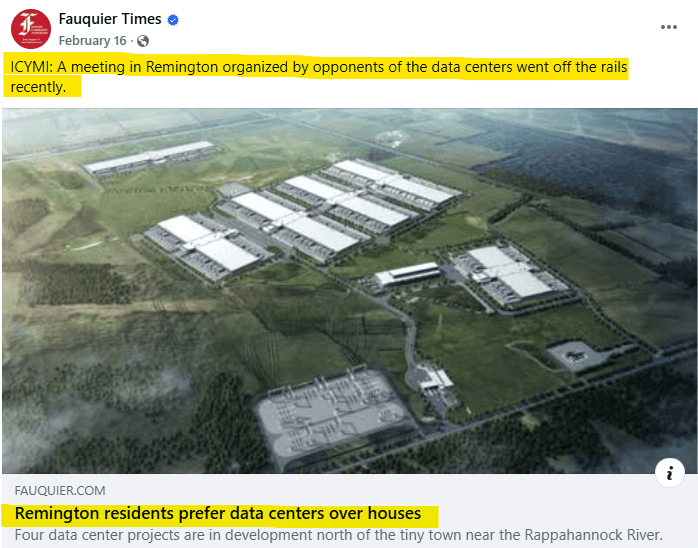Facts vs. Fiction
Gigaland Data Center in Remington
Facts vs. Fiction
Gigaland Data Center in Remington
Fiction: “The County has plenty of money; we don’t need more.”
Fact: Today, 74% of families in parts of Fauquier fall under the "ALICE" threshold—earning too much to qualify for aid but not enough to make ends meet. At the same time, our county faces persistent teacher vacancies, making it harder to retain talent and ensure quality education for our students. Meanwhile, basic infrastructure projects, like a single water tower, can take decades to fund. Should we really celebrate a status quo that leaves families struggling, classrooms understaffed, and infrastructure underfunded?

Fiction: “Gigaland is being built on farmland.”
Fact: The proposed site has never been farmland. It was logged years ago and is currently zoned R-1 residential (one house per acre). Today, it’s mostly stumps and overgrowth—many neighbors consider it an eyesore.
It is also surrounded by industrial neighbors:
- ODEC power plant
- Remington–Warrenton training facility
- RTP data center (under construction)
- Dominion solar farm and power station
- A junkyard
To those concerned about farmland preservation: please visit the site. You’ll see a location that’s ideally suited for data center infrastructure, not a pristine farm field.

Fiction: “Gigaland will use millions of gallons of water.”
Fact: Some opposition group members continue to claim that Gigaland will use “millions of gallons” of water, despite the fact that Fauquier County ordinances explicitly prohibit data centers from using water for cooling. This is simply false—and they’ve been informed of this repeatedly. We’re not draining wells – the facility is not allowed to use water for cooling as per zoning ordinance and written proffers
Fiction: “The project will cause massive flooding.”
Fact: By law, developers must reduce—not increase—stormwater runoff. Gigaland’s plan includes advanced retention ponds that will actually improve drainage compared to current conditions.
Fiction: “Gigaland will require new high-voltage power lines.”
Fact: Critics claim that Gigaland would require the construction of new high-voltage power lines. In reality, Dominion Energy has already announced plans to upgrade the existing transmission lines between the Marsh Run Substation and the Remington Substation—the same high-voltage lines that currently cross the Gigaland site. Our proposed data centers would simply connect to this existing infrastructure, not drive its creation. These replacements are moving forward regardless of whether Gigaland is approved. The real question is: Will Fauquier County seize the opportunity to benefit from this infrastructure—or let the economic gains flow to Culpeper or another neighboring county instead.
Fiction: “Gigaland will raise your power bill.”
Fact: Another common scare tactic is the claim that Gigaland if approved will raise your electric bill. The reality is that electricity rates are increasing across the board as Dominion Energy continues modernizing its grid throughout Virginia, North Carolina, and South Carolina. All ratepayers—including those in Fauquier—have been and will continue to share the cost of these upgrades. Gigaland’s allocated power capacity, plan for transmission and distribution already exists. If it isn’t used here, Dominion has informed us it will simply be redirected elsewhere Culpeper or PWC. In short if that capacity isn’t used in Fauquier, it won’t be taken off the grid—it will simply be redirected to another jurisdiction, along with the economic opportunity that comes with it. For years, Fauquier residents along with all other rate payers have been footing Dominion’s infrastructure projects, whether the power lines served Prince William, Loudoun, or other counties. It’s time for Fauquier to receive its share of economic return—instead of merely footing the bill while neighboring counties reap the economic rewards. As previously noted Dominion Energy’s plan to upgrade the transmission lines running from the Marsh Run Substation to the Remington Substation is already in motion, and as noted earlier these lines happen to cross directly over Gigaland’s proposed site. Our project would tap into this existing infrastructure, not trigger its construction.
You can view Dominion’s official plan here: https://www.dominionenergy.com/about/delivering-energy/electric-projects/power-line-projects/remington-marsh-run
Fiction: “Data centers don’t create jobs.”
Fact: Some opponents claim data centers don’t create many job opportunities — but is that really true? According to a report from global consulting firm PwC (PricewaterhouseCoopers)—one of the world’s “Big Four” professional services firms, each data center job supports more than six additional jobs in the broader business ecosystem. And these aren’t just temporary construction roles.
Data centers rely on a wide-ranging and interconnected network of local service providers, suppliers, and partners in every market where they operate. In Virginia, this includes consulting firms, engineering and design teams, equipment rental companies, maintenance and monitoring services, call centers, security firms, landscapers, snow removal crews, irrigation specialists, telecommunications companies, apparel and signage vendors, electricians, mechanical and water system experts, fire protection services, testing and commissioning professionals, sustainability consultants, and many more.
It’s not just about engineers managing servers — it’s about an entire economic ecosystem fueling steady, long-term job creation.
For Fauquier County residents, this is a real economic opportunity. It means more local jobs, less time spent commuting, and new growth for small businesses and tradespeople right here in the county.
You can access the report here: https://static1.squarespace.com/static/63a4849eab1c756a1d3e97b1/t/67b38f78e9cf125daf756112/1739820925392/Data+Center+Economic+Contribution+Study+2025_Final.pdf
Fiction: “Generators will run 24/7.”
Fact: Generators won’t run 24/7 – they are emergency backup systems that are tested briefly, approximately 15-30 minutes per month, as required and regulated by the Virginia Department of Environmental Quality (DEQ).
Fiction: “Home values will drop.”
Fact: Home values doubled in Ashburn adjacent to data centers
Some opponents have expressed concern that if the Gigaland site is developed, their home values could decline. Since no publicly available data or research confirms this claim, we decided to investigate it ourselves.
We picked a random neighborhood in Ashburn that is literally surrounded by data centers and pulled 10 years of actual home sales records—not tax assessments, not Zillow estimates, but real, closed sales.
What we found was striking:
Homes that sold for $675K–$800K back in 2015–2017 are now selling for $1.3M–$1.6M in 2024. That’s nearly a doubling in value—despite being directly adjacent to large data center campuses.
The numbers speak for themselves. Far from hurting home values, this data shows consistent and strong appreciation over time—even in the heart of “Data Center Alley.”

Fiction: “Taxes rates won’t go down.”
Fact: There’s a false narrative circulating that property tax rates in Prince William and Loudoun counties continue to rise despite the significant revenue generated by data centers. In reality, the opposite is true.
Prince William County has lowered its property tax rate for 2024. Loudoun County has steadily reduced its rate over the past decade—from $1.205 per $100 of assessed value in 2015 to $0.805 in 2025, a nearly 33% decrease. This has been made possible in large part by the substantial tax contributions from data centers, which now account for nearly 40% of Loudoun’s total revenue.

Fiction: “Remington and The Meadows are against Gigaland.”
Fact: The only official meeting discussing Gigaland was Planning commissions meeting.
More than a dozen residents from Remington and the Meadows community — those closest to the proposed site — spoke in favor of the project.
Only one person from Remington spoke in opposition.
LET THAT SINK IN.
Meanwhile, 99% opposition came from outside the Lee District, and in many cases, outside Fauquier County altogether.
Here is the article from Fauquier Times https://www.facebook.com/share/p/1MrYE1XcJ1/

Fiction: “Rezoning Gigaland sets a dangerous precedent.”
Fact: Every rezoning in Fauquier is reviewed individually. This is not a blanket approval. Gigaland’s site is uniquely suited for this use, with existing power lines, substations, power plants, solar farms, and a junkyard nearby. The proposal reflects extensive community input.
Fiction: “The farmland proffer isn’t meaningful.”
Fact: Some opponents have dismissed Gigaland’s proffer as insufficient or vague. In reality, this would be the largest single investment in Fauquier County’s Purchase of Development Rights (PDR) program in history. The Piedmont Environmental Council (PEC) has long advocated for increased PDR funding—so opposing commitment to permanently preserve farmland directly contradicts the mission they’ve championed for decades.
As you well know PDRs are voluntary, permanent, and litigation-free. Every easement secured through this program ensures that farmland is protected from future development—forever. This isn’t just a contribution. It’s a generational opportunity to preserve the rural character of Fauquier County.
__________________________________________
Shifting the Goalposts
When we first engaged with opposition groups a couple of years ago, they told us they wouldn’t object to the project if the nearby Meadows HOA—the community closest to the site—was supportive. So we went directly to residents, knocked on doors, and listened. What we found was overwhelming support from the neighborhood.
Then the narrative changed. They claimed the Town of Remington was against the project—until the Town Council, the elected governing body of Remington, formally submitted a letter to you - the Board of Supervisors endorsing the data center proposals near Remington.
Then the narrative shifted once again—this time, the focus became the Lee District. Yet residents there also expressed strong support for the project, and Lee District Planning Commissioner John Meadows formally recommended approval of the proposed Gigaland data center rezoning application. Unfortunately, planning commissioners from other districts did not share his view and voted against the recommendation.
Now, the opposition claims that Lee District can no longer speak for itself—that this is a county-wide issue. It’s clear that the goalposts keep moving, and so do the reasons for opposition. Even so, we’ve appreciated the chance to meet many residents face-to-face and have meaningful conversations about this project, reaching every household personally isn’t feasible—which is why we engaged a local voter outreach firm to help connect residents with County staff through emails and patch-through calls. When concerns were raised about a number of entries (such as incorrect addresses or questions about consent), we immediately—stopped the campaign and launched a full audit of all contacts.
We welcome transparency and accountability. And we believe If we are to have a fair and informed dialogue about the future of Fauquier County those same standards should apply equally to opposition emails, many of which were submitted without names, addresses, or any form of verification.
__________________________________________
Real Solutions
Opposition groups often voice criticisms without offering practical alternatives. Ironically, many of the same individuals calling for higher teacher pay and better-funded fire and rescue services have offered no plan for how to fund them.
So let’s consider the questions that too often go unanswered:
- Can Fauquier County continue operating effectively without expanding its commercial tax base?
- Can County realistically retain teachers, firefighters, and deputies when neighboring counties are offering $15,000 to $30,000 more in annual salaries?
- Can County repair aging infrastructure while relying almost entirely on homeowners to foot the bill?
Our proposed single data center campus will generate millions of dollars annually to the county through Business Personal Property (BPP) taxes—far exceeding the revenue typically produced by a warehouse, retail center, or new residential development.
Loudoun County is a clear example of the broader impact. While it’s fair to acknowledge that Loudoun has made mistakes—particularly in how some data centers were sited—it has also demonstrated the powerful fiscal benefits of this industry. Over the past decade, Loudoun has reduced its property tax rate by more than 30%, all while investing in new schools, enhancing public parks, and attracting top-tier educators. Much of that progress has been made possible through tax revenue from data centers. There's a lesson here for other counties: with smart planning, you can get it right and without a doubt, Fauquier County Department of Community Development is on that very path.
Meanwhile, Dominion Energy has more than 200 data center projects in its queue across their service area Virginia and the Carolinas. Most of these projects are moving forward. The question isn’t if—they will be built. The question is where. Will Fauquier County seize this opportunity, or will we watch it go to a neighboring jurisdiction? Saying “no” to Gigaland won’t stop data center expansion. It simply shifts the benefits elsewhere.
We’re not asking for blind support—we’re asking for a fair, fact-based evaluation of what this project can mean for county’s future.
Gigaland represents more than a data center. It’s an opportunity to responsibly grow counties tax base, invest in schools, support first responders, and preserve the very farmland that makes Fauquier so special.
